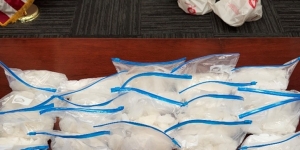Press Release
Jury Finds Sacramento Area Drug Trafficker Guilty on All Counts
For Immediate Release
U.S. Attorney's Office, Eastern District of California
SACRAMENTO, Calif. — Today, after a five-day trial, a federal jury found Isreal “Puck” Washington, 41, of Sacramento, guilty of all 10 counts in the indictment for trafficking heroin, cocaine, cocaine base, and methamphetamine, United States Attorney Benjamin B. Wagner announced.
“Under the Smart on Crime initiative, the U.S. Department of Justice has refocused its narcotics prosecution efforts against the most significant and dangerous offenders.” U.S. Attorney Wagner stated. “Washington is one of those persons. This marks the end of his drug empire.”
This case is the product of an investigation by the Drug Enforcement Administration, the Sacramento County Sheriff’s Office, the Sacramento Police Department, the Vallejo Police Department, and the Sacramento County District Attorney’s Office.
According to court documents and evidence presented at trial, in 2010, Washington distributed large amounts of cocaine base, cocaine, and heroin in the Sacramento area. Washington used various businesses as a front to conceal and disguise his extensive drug trafficking and operated a large “crew” of gang members as his drug distribution organization. During an investigation in 2010 and 2011, one of Washington’s businesses, Wet Ways Auto Body and Paint Shop, was identified as a place where Washington and his associates conducted drug deals.
In 2012, an undercover operative bought heroin and methamphetamine from Washington’s organization. The drug traffickers operating under Washington included co-defendants Deyonte Spears, 27, of Oakland, and Sacramento residents Tyrone Weathersby, 47; Anthony Sanchez, 31; and Myron Meadows, 44. On May 21, 2013, the DEA served search warrants at two Sacramento-area stash pads controlled by Washington. Agents seized a stolen firearm and more than three pounds of heroin at stash pads maintained by the group.
Charges are pending in a separate indictment against Washington that stems from a 2011 homicide investigation. When deputies executed a search warrant at Washington’s residence, they discovered three semi-automatic pistols, including one with a high-capacity magazine. The indictment alleges that Washington is prohibited from possessing firearms because of four prior felony convictions for drug trafficking and assault with a deadly weapon. A status conference for that case will be set in the near future. (Docket # 2:13-cr-207 MCE)
Washington is scheduled to be sentenced on October 1, 2015, by United States District Judge Morrison C. England Jr. Washington’s co-defendants have all previously pleaded guilty. Co‑defendant Spears is scheduled to be sentenced on July 16, 2015; co‑defendant Weathersby was sentenced to 18 months in prison on October 24, 2014; co‑defendant Sanchez is scheduled to be sentenced on September 10, 2015, and co‑defendant Meadows is scheduled to be sentenced on August 13, 2015. Because of his criminal history, Washington faces a mandatory minimum sentence of 20 years in prison on each of counts two and eight. On the remaining counts, Washington faces maximum statutory penalties of up to life in prison and statutory mandatory minimum sentences of 10 years. the other defendants also face sentences of at least 10 years in prison on the counts to which they have pleaded guilty. The actual sentences, however, will be determined at the discretion of the court after consideration of any applicable statutory factors and the Federal Sentencing Guidelines, which take into account a number of variables.
This case is part of an Organized Crime Drug Enforcement Task Force (OCDETF) program that was established in 1982 to conduct comprehensive, multi-level attacks on major drug trafficking and money laundering organizations. The principal mission of the OCDETF program is to identify, disrupt, and dismantle the most serious drug trafficking and money laundering organizations and those primarily responsible for the nation’s drug supply.
When prosecuted in federal court, drug traffickers typically receive much harsher sentences. In addition to the longer sentences imposed, unlike state court prisoners who are released early on parole, there is no early release on parole in the federal system.
Updated July 9, 2015
Topic
Drug Trafficking
Component

 U.S. Department
of Justice
U.S. Department
of Justice
